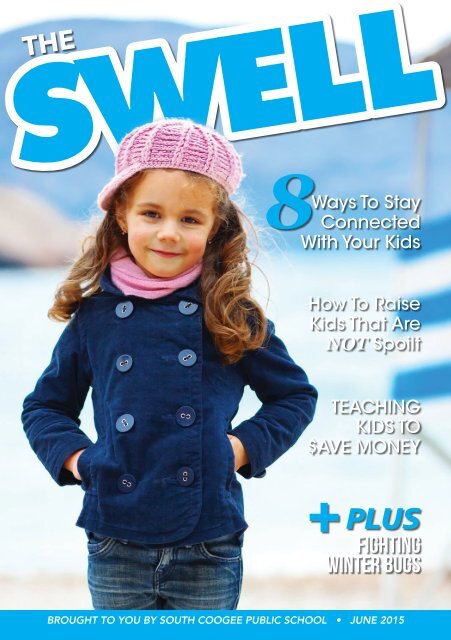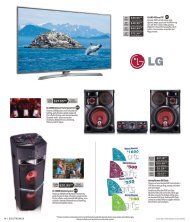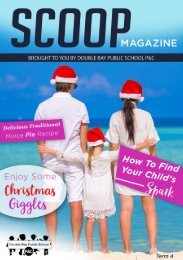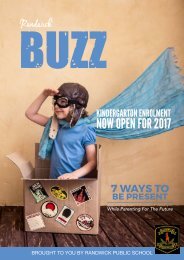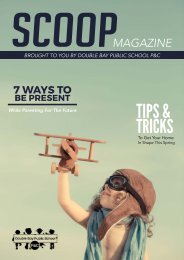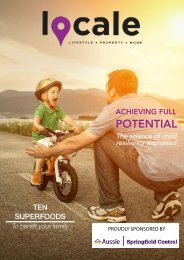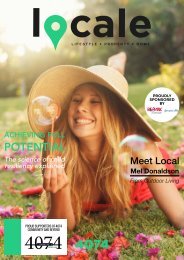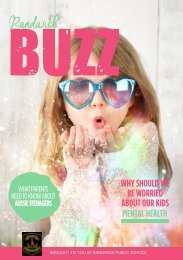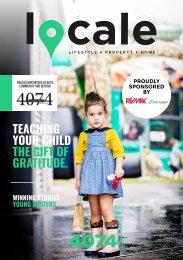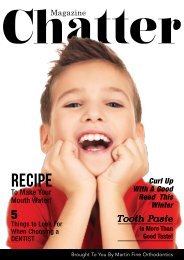SWELL JUNE 2015
You also want an ePaper? Increase the reach of your titles
YUMPU automatically turns print PDFs into web optimized ePapers that Google loves.
THE<br />
<strong>SWELL</strong><br />
Ways To Stay<br />
Connected 8With Your Kids<br />
How To Raise<br />
Kids That Are<br />
NOT Spoilt<br />
TEACHING<br />
KIDS TO<br />
$AVE MONEY<br />
FIGHTING<br />
WINTER BUGS<br />
BROUGHT TO YOU BY SOUTH COOGEE PUBLIC SCHOOL • <strong>JUNE</strong> <strong>2015</strong>
putting your neighbours to work
Contents<br />
••<br />
Chit Chat keeps us up to<br />
date with what’s on this<br />
month.<br />
••<br />
8 ways to stay connected<br />
with your kids.<br />
••<br />
A delicious, healthy and<br />
nutrient packed Minestrone<br />
Soup recipe that will keep<br />
the family warm this winter.<br />
••<br />
How to raise kids that are not<br />
spoilt.<br />
••<br />
Dr Joanna McMillan gives us<br />
tips on how to keep winter<br />
bugs at bay.<br />
••<br />
Strategies that will help<br />
teach your kids how to save.<br />
••<br />
Why goal setting is important<br />
for kids and ways we can<br />
help them achieve them.<br />
••<br />
Matt Richards our AP Stage<br />
3 and Information and<br />
Technology coordinator hits<br />
the Swell Hot Seat.<br />
••<br />
10 great tips to help<br />
you feel great from this<br />
month’s Supporter in the<br />
Spotlight – Pacific Square<br />
Physiotherapy.<br />
From The Editor<br />
Welcome back to yet<br />
another issue of Swell<br />
Our last for Term 2.<br />
It is hard to believe that it is already<br />
the middle of the year and we have<br />
reached the half way mark!<br />
<strong>2015</strong> is literally flying by …<br />
Winter has certainly arrived and<br />
Sydney is experiencing a definite<br />
drop in temperature and with the<br />
chilly weather comes the dreaded<br />
coughs and colds and winter bugs.<br />
In this issue, Dr Joanna McMillan<br />
gives us some very helpful advice on<br />
how to boost our kid’s immunity this<br />
winter and keep the lurgies at bay!<br />
We also cover a variety of other<br />
topics from how to teach your kids<br />
to save, to ways to stay connected<br />
with our children and so much<br />
more.<br />
I hope that you enjoy this issue of<br />
Swell as much as I have enjoyed<br />
compiling it and I wish you and your<br />
family a wonderful winters break.<br />
See you next term!<br />
GEORGINA SENES<br />
About Our Editor<br />
Georgina Senes has had more than 15 years<br />
as a journalist writing for some of Australia’s<br />
leading parenting and family magazines<br />
including: Australian Parents Magazine,<br />
Pregnancy Magazine, Family Living Magazine.<br />
As well as that she has held editorial roles<br />
at one of Australia’s largest niche lifestyle<br />
publishers. As a mother of three girls she lives<br />
and breathes parenting…<br />
Created, Designed & Delivered By...<br />
themillenniaproject.com<br />
For All Advertising Enquiries Call 1300 900 171<br />
3
STAGE 3 NEWS<br />
Well done to all of the Year 5 students who<br />
recently completed NAPLAN. Although it was a<br />
busy week for you we know you did your best! We<br />
also had a great celebration with the Movie Night<br />
on the Friday which raised $1800 for the Year 6<br />
fundraiser. Thanks to everyone who supported this<br />
event!<br />
Year 5 and 6 students were amazed by the<br />
Amazing Me night that was put on earlier this<br />
term and they learnt a lot about the changes that<br />
they will be facing in the future. Thanks to Mrs<br />
Rowena Thomas for enthusiastically approaching<br />
an interesting topic for our families in a very<br />
relaxing manner.<br />
Finally if you haven’t had a chance already, please<br />
visit the Stage 3 Enterprise Education website to<br />
investigate the wonderful work that students have<br />
been completing in class. Each business has their<br />
own page where they are advertising the product<br />
that they are collecting orders for and selling.<br />
www.enterpriseeducation.weebly.com<br />
Stage 3 Teachers<br />
Enterprise Student Item<br />
This term stage 3 students were put into groups<br />
and sent to make up a product. The topic this term<br />
is Enterprise which means supplying a product and<br />
not copyrighting. Some of the groups had ideas<br />
that were: necklaces, photo frames, cards, hats<br />
and more. We had to do this step by step and<br />
some of the steps were: brainstorming, choosing<br />
a product, working out what each material costs,<br />
making a prototype and advertising in a variety<br />
of ways. Most of the mini business’ are up to<br />
the stage making a prototype and advertising.<br />
But it is not a simple as you think!!! Students<br />
need to be aware of the fees and bank managers<br />
[teachers]. They are waiting for their loans to be<br />
approved while collecting orders. And it really<br />
helps us to understand money. For example, if<br />
one of the groups were making dolls and made<br />
5 unsuccessful prototypes with each one costing<br />
$7 that would be very wasteful! There is only one<br />
way to get profit and that’s by selling the dolls and<br />
paying back the load as quickly as possible. At the<br />
end of the term bank managers will identify the<br />
group that has made the most profit. The amazing<br />
thing about enterprise is all the money goes to a<br />
Year 6 fundraiser or charity which will be decided<br />
soon.<br />
5
FIGHTING<br />
WINTER<br />
BUGS<br />
Winter is upon us and with it comes a whole host of cough, cold and flu bugs for<br />
families to contend with. So is there anything we can do to help our kids catch<br />
fewer coughs and colds this winter, and not get so sick when they do?<br />
I can’t talk about nutritional links<br />
without first reminding us all of how<br />
these bugs are transmitted. Despite<br />
the name “the cold” kids (nor adults)<br />
catch the cold by getting cold. The<br />
cause is a virus (and there are many)<br />
and spread through infected others<br />
coughing and spluttering near us.<br />
Most viruses cannot live for long,<br />
if at all, on inanimate surfaces, so<br />
spraying every surface in the house<br />
with chemicals is not the answer.<br />
Since we cough into our hands,<br />
and kids are likely to be wiping<br />
their noses on their hands, frequent<br />
hand washing with soap is a major<br />
line of defense. I am not a fan of<br />
using antibacterial soaps, sprays and<br />
potions. These have not been shown<br />
to be any more effective than good<br />
old-fashioned soap and water. In<br />
fact they may be more harmful by<br />
eliminating good bacteria around us<br />
and why introduce a whole host of<br />
chemicals to our kids environments?<br />
You can have a clean house without<br />
the use of chemicals that are harmful<br />
to our kids, our environment and us.<br />
But I digress, back to kids immunity.<br />
Good nutrition provides the building<br />
blocks of a strong immune system.<br />
Kids that eat poorly are far more<br />
likely to pick up every bug going<br />
around, and when they do get sick<br />
they will tend to be sicker for longer<br />
than healthier kids. There are of<br />
course other reasons why immunity<br />
can be affected, but there is no doubt<br />
that being well nourished is key. The<br />
nutrients the immune system needs<br />
is extensive and includes vitamin<br />
C, zinc, iron, vitamin A, vitamin E,<br />
calcium, selenium and numerous<br />
phytochemicals (plant chemicals).<br />
What this means is that there is no<br />
one food that can boost immunity,<br />
rather a whole host of different<br />
nutritious foods are required. That<br />
is good news. It means it doesn’t<br />
matter if you can’t get your kid to<br />
eat an orange, if s/he will eat a range<br />
of other plant foods. To get you<br />
started here are my top 10 immunity<br />
boosters for kids:<br />
1<br />
2<br />
3<br />
4<br />
Carrots: one of the richest sources of betacarotene,<br />
an antioxidant in its own right but<br />
can also be converted to vitamin A in the body.<br />
Try grating or finely chopping them into stews,<br />
Bolognese or soups, or serve them raw as batons.<br />
Avocado: although not as high in vitamin<br />
E as seeds, that they do contain is far more<br />
available since it is not taken up protecting the<br />
polyunsaturated fats in the food. Vitamin E is<br />
critical to the anti-viral defense mechanisms of<br />
the body.<br />
Onions, leeks and garlic: from the same<br />
family these vegetables contain the antioxidant<br />
quercetin which is antibiotic and anti-viral. It is<br />
not destroyed by cooking – thank goodness as<br />
not many kids I know will crunch on raw onion in<br />
a salad. But try making a leek and potato soup,<br />
or throw onion and garlic into their pasta sauce.<br />
Cauliflower: often ignored in favour of its<br />
greener cousin broccoli. That’s a shame as most<br />
kids I know happily eat cauliflower. Cauliflower<br />
contains a group of phytochemicals called<br />
glucosinolates, as well as B group vitamins and<br />
fibre, all-important for immune function.<br />
5<br />
6<br />
Dark leafy greens: including spinach, watercress<br />
and cabbage. OK so you’re thinking there is no<br />
chance your child will eat any of these. My kids<br />
are just the same and will not touch them if they<br />
are served up as salad (although keep persevering<br />
– older kids will generally start to like salad). But<br />
think outside the square and blitz them up with<br />
stock to make “green soup” (yes they’ll rename it<br />
but so long as they eat it so what” or finely shred<br />
it and add to sauces and stews. Make a paste of<br />
wilted greens blended with ricotta cheese, a little<br />
grated nutmeg and roll up in lasagna sheets to<br />
make cannelloni or make a green sauce for ravioli<br />
or gnocchi.<br />
Beans, chickpeas and lentils: 70% of the<br />
immune system is in the gut and so good gut<br />
health is at the core of strong immunity. Legumes<br />
are rich in soluble fibre and resistant starch, both<br />
of which fuel the good<br />
bacteria in the gut and in<br />
turn boosts immune<br />
function. They<br />
also provide<br />
plant protein<br />
and an array<br />
of nutrients.<br />
6
7<br />
8<br />
Nuts and seeds: these foods are serious<br />
nutritional powerhouses. It’s such a shame that<br />
with the risk of allergy many kids are not eating<br />
them. If your own kids are not allergic then<br />
make the most use of these foods outside of<br />
school. They provide vitamin E, fibre, healthy<br />
fats, magnesium, zinc and healthy fats. I sprinkle<br />
home roasted nuts over my kids porridge, give<br />
them a ramekin mix of nuts, seeds, dried fruit<br />
and dark chocolate pieces for afternoon tea,<br />
spread pure nut butter on toast or in sandwiches,<br />
and drizzle nut oil over their vegies.<br />
Kiwi fruit: berries become so expensive over<br />
winter I stop buying them fresh. Kiwi are great<br />
at this time of year however and in terms<br />
of vitamin C content, they rate only behind<br />
guava! I simply half them and serve them to<br />
my kids with a spoon.<br />
9<br />
10<br />
Probiotics: a good body of evidence now shows<br />
that children given a good probiotic experience<br />
fewer respiratory infections and when they do<br />
catch a cold they kick it into touch faster. You can<br />
choose from giving them a probiotic supplement<br />
drink or supplement or a probiotic yoghurt. What<br />
is crucial is that you use a tried and tested bacterial<br />
strain – look for the evidence behind the product –<br />
and give it to them daily.<br />
Turkey leg: most kids love poultry but we tend to<br />
rely on chicken. Give turkey a try and go for the<br />
brown meat. It provides more iron and zinc than<br />
the breast, and provides selenium, B group vits<br />
and other immune-boosting nutrients. It’s<br />
also cost effective with a couple of turkey<br />
legs easily feeding the whole family. Plus<br />
the Fred Flintstone connection will get<br />
the kids tucking in happily!<br />
Finally don’t forget the importance of making sure your kids get enough sleep. Being run down<br />
and tired is the fastest route to depressed immunity. A well-nourished and well-rested body is<br />
the one that can most readily stave off this years winter coughs and colds.<br />
Dr Joanna McMillan<br />
Registered Nutritionist and Accredited Practising Dietitian.<br />
For more information on 'The Dr Joanna Plate' go to www.drjoanna.com.au, your trusted nutrition and healthy lifestyle hub.<br />
7
EARLY!<br />
STAGE 1 NEWS<br />
Kindergarten have been working very hard this<br />
term discovering many new and wonderful things.<br />
We have been learning about built and natural<br />
environments as part of our HSIE and Science and<br />
Technology unit. As part of this unit, we attended<br />
the Botanical Gardens. We are very excited to go<br />
on our first excursion! Watch this space!<br />
Earlier this month, Kindergarten students<br />
celebrated Mother’s Day with all our special mums.<br />
We had a wonderful breakfast, kindly organised<br />
by the P&C and Kindergarten students sang two<br />
special songs. Parents were then invited back to<br />
their child’s class to read, sing, dance, and create<br />
wonderful artworks. It was such a fun morning<br />
and we loved seeing everyone’s happy faces.<br />
Our K-2 Cross Country was a big success and<br />
all students had fun participating in the fun run.<br />
It was such a long distance for Kindergarten<br />
students, but everyone did their very best and<br />
some students ran two or three times around the<br />
school! Outstanding work Kindergarten!<br />
Kindergarten classes voted earlier in the term for<br />
our first Eco Warriors. We are proud to present our<br />
Eco Warriors for Term 2.<br />
KC – Leila and Vincent<br />
KF – Kyson and Lucy<br />
KD – Maya and Asher<br />
KS –Yuuri and Jace<br />
Eco Warriors have many jobs around the school<br />
including, turning offtaps and lights, looking after<br />
our playgrounds and helping with our gardening<br />
and compost programs. They are role models for the<br />
other Kindergarten children, encouraging everyone<br />
to look after our environment.<br />
KW – Greg and Zara<br />
9
8W<br />
A<br />
Y<br />
S<br />
TO STAY CONNECTED<br />
WITH YOUR KIDS<br />
By Georgina Senes<br />
Every parent cherishes those moments when they feel connected with their kids – those<br />
are the times when it feels like it’s all worthwhile and that your heart could just melt.<br />
Connection is as important for parents as it is<br />
for our children. It is the link that keeps your<br />
relationship strong and healthy and which<br />
allows you to be a trusted guide to your child. Kids<br />
who feel strongly connected to their parents want to<br />
cooperate. They trust their parent’s judgement and<br />
respect their advice. Once parents start focussing on<br />
connecting instead of correcting the whole dynamics<br />
of their relationship with their child changes – for the<br />
better.<br />
Parenting is the toughest job on the planet and there<br />
are days when we all do it brilliantly and others when<br />
1<br />
Quality One-On-One Time Is a<br />
Priority<br />
Whilst family time is essential, most<br />
children also crave and actually need, individual<br />
quality time with their parents without the<br />
diversion of other siblings. Spending some one on<br />
one time with your child allows you to really tune<br />
into how they are feeling and what is going on in<br />
their world. Giving them your undivided attention<br />
makes them feel special and lets them know how<br />
important they are to you.<br />
Share A Meal Together Every Day<br />
can barely cope with the basics of feeding, bathing<br />
and getting them to bed– its part of being human and<br />
it’s a side effective of our insanely busy lives that see<br />
parents trying to juggle too many balls whilst at the<br />
same time trying to keep the whole family happy.<br />
The key to developing a strong bond with your<br />
children is to incorporate connection into your families<br />
every day routine and build daily habits that help you<br />
to feel closely linked to one another.<br />
Here are some simple every day strategies that<br />
you can do to help you connect with your kids:<br />
Practice Gratitude<br />
Help your child to develop the gift of<br />
gratitude and you will find that it will<br />
help them to develop an optimistic attitude and a<br />
greater appreciation for life. Asking your child to<br />
tell you three things each day that they are grateful<br />
for is a great way to start promoting thankfulness<br />
and appreciation. Likewise you should tell your<br />
child the three things that you are grateful for each<br />
and every day and they will hear first hand what it<br />
is in life that makes you happy.<br />
Amongst hectic work and school schedules and the demands of life in general, sharing a meal<br />
together as a family is often a herculean task – but one that is both necessary and worthwhile.<br />
Meals together give a family time to nurture connection between each of its members and to<br />
share stories and events from the day. It is a time to focus on each other, to share, to listen and<br />
most importantly to connect.<br />
2<br />
3<br />
10
4<br />
Listen and Show Empathy<br />
The key to connection is listening.<br />
Sometimes you might need to bite<br />
your tongue and resist the temptation to offer<br />
up advice and solutions and just listen. It is<br />
also useful to be able to look at the situation<br />
from your child’s perspective – put yourself<br />
in their shoes and try and imagine how it is<br />
that they are feeling. Trying to understand<br />
how your child is feeling will go a long way<br />
towards you being able to see and understand<br />
the reasons for certain behaviours and will<br />
also help you to regulate your responses to<br />
them.<br />
6<br />
Take a Technology<br />
Time Out<br />
We are all guilty of over indulging in<br />
technology, constantly checking our mobile<br />
for messages or sneaking in some extra time<br />
on the ipad. Take time out of your families<br />
week to switch off all devices and have a<br />
technology ban. Turn the TV off and get<br />
outside and throw a ball with your kids,<br />
play some games or have a chat. Spending<br />
time together without the distraction of<br />
technology enhances both communication<br />
and connection.<br />
Be Present<br />
Play<br />
Laughter and roughhousing help<br />
keep you connected with your child<br />
by stimulating endorphins and oxytocin in you<br />
both. There is nothing more bonding than<br />
a good laugh and play with your kids – its<br />
physically and emotionally satisfying. Making<br />
playfulness a regular feature in your child’s day<br />
helps them to work through any of the stresses<br />
and anxieties that they may have experienced –<br />
it gives them a much-needed release!<br />
Have a Snuggle<br />
For many parents and children the<br />
sacred snuggle up in bed at the end<br />
of the day is the sweetest time they every have<br />
together. Those quiet, companionable, safe<br />
moments of connection allow you and your child<br />
to really bond and savour the love and warmth<br />
of your relationship. When you lie with your child<br />
in a darken room and relax together you will be<br />
surprised at what communication can take place.<br />
Children tend to use this time to confide in their<br />
parents, let their guard down and open up about<br />
how they are feeling. This is a precious time<br />
between parent and child and should feature<br />
regularly in your nighttime routine. Don’t give it<br />
up as your child gets older – late night is often<br />
the only time teens will open up.<br />
Most of us muddle our way through life being half-present. Rushing from one thing to<br />
the next, so busy trying to tick all the boxes that we forget to savour the moment. Your<br />
child is only a child for a very brief window of time and before you know it they will be all<br />
grown up and you will be left wondering where all the time went? Try to slow things down<br />
and to actively engage with your child when you are with them – right here, right now. Its<br />
unrealistic to be completely and exclusively engaged with your child all of the time – life<br />
simple gets in the way but try and do it a little bit every day and you will soon find yourself<br />
naturally doing it more and more. The results will be those heart warming moments of<br />
connection that makes parenting all worth it.<br />
5<br />
7<br />
8
Poster
Extracurricular<br />
ACTIVITIES<br />
for your Child<br />
How Much<br />
is Too Much?<br />
Dancing, karate, tutoring, piano, soccer, nippers, drama and French… how<br />
much is too much when it comes to extracurricular activities? With school<br />
curriculums more overloaded than ever before it is not surprising that<br />
extracurricular activities are contributing to making your child happy and<br />
“all rounded”. But with all the activities available to us, we must ask… how<br />
much is too much?<br />
The PROS for KIDS<br />
There is no doubt about it, extracurricular<br />
activities provide a vast range of benefits for<br />
children, including the opportunity to…<br />
• learn new skills and accept challenges<br />
• broaden their social circles<br />
• increase self-confidence<br />
• learn and understand commitment<br />
• become an all-rounded individual<br />
The CONS for KIDS<br />
So with all those benefits, can kids be doing<br />
too much? Well sometimes too many activities<br />
can cause your child to…<br />
• fall behind on school work<br />
• feel overwhelmed, pressured or anxious<br />
• become overtired without enough time to rest<br />
and play<br />
• have no time to enjoy being a child!<br />
The PROS for PARENTS<br />
Extracurricular activities don’t just affect<br />
children but their parents too. Some positive<br />
outcomes can include the opportunity to…<br />
• support your child in different areas<br />
• discover your child’s other interests / talents<br />
• meet other parents and children<br />
• give you some YOU time (we all need it!)<br />
The CONS for PARENTS<br />
Too many activities, however, can become a<br />
strain on parents for a variety of reasons…<br />
• financial costs<br />
• time and schedule conflicts<br />
• dividing time fairly between your children<br />
• mastering the balance of saying yes or no<br />
when all the options seem beneficial<br />
So… HOW MUCH IS TOO MUCH?<br />
As the owner of a local Dance, Fitness and<br />
Performing Arts Studio, I see over one hundred<br />
children pass through my doors each week and<br />
it is my privilege to watch them learn, grow<br />
and have fun!<br />
But like anything we do in life - moderation is<br />
the key. So parents, don’t be overwhelmed! I<br />
encourage you to find the balance between ‘yes’<br />
and ‘no’ by discovering and supporting your<br />
child’s talents and interests through a variety<br />
of activities. Teach good habits by enforcing a<br />
level of commitment, yet stay in tune with your<br />
child’s need to rest, do homework and play. For a<br />
balanced lifestyle is a happy and healthy lifestyle.<br />
Amy Townsend<br />
For more information on finding the best<br />
extracurricular activity for your child,<br />
please contact Amy at Aussie Bodz -<br />
0402 255 155 or amy@aussiebodz.com.au<br />
13
How To Raise Kids<br />
That Are Not Spoilt<br />
By Georgina Senes<br />
One of a parent’s worse<br />
nightmare is having a child<br />
who comes across as spoilt and<br />
ungrateful.<br />
We all struggle to provide<br />
our children with all of life’s<br />
advantages and to give them<br />
everything that we can – we<br />
want them to have every<br />
opportunity and to be able to<br />
get the most out of life.<br />
That is why for many of us we<br />
find it so disconcerting when<br />
we see our or other children<br />
who have been given every<br />
advantage act like eye rolling,<br />
feet stomping, spoilt brats.<br />
Its an awful feeling when you<br />
see your children behaving<br />
like selfish, entitled creatures,<br />
constantly demanding more<br />
and more and not realising<br />
how lucky they are to have<br />
what they have and realise<br />
how much more they have<br />
compared to so many. Any<br />
mum of dad who has a had a<br />
child cry or throw a tantrum<br />
when you have told them<br />
that you wont buy them<br />
another toy or piece of<br />
clothing knows the feeling.<br />
Most parents will regretfully<br />
admit to feeling that at one<br />
time or another their child<br />
is spoilt and ungrateful. Its<br />
part of the parenting code of<br />
conduct – something we all<br />
experience.<br />
Luckily, there are many<br />
small things that you can<br />
do and strategies that you<br />
can implement that will help<br />
to encourage your child to<br />
appreciate their life and to<br />
grateful for all that they have.<br />
Like most things in the<br />
parenting world it takes<br />
time and consistency so<br />
don’t expect a miracle<br />
overnight. Plug away and<br />
enforce the following<br />
techniques and lifestyle tweaks<br />
into your family’s routine and<br />
hopefully at the end of the<br />
day your child will be thanking<br />
you!<br />
Make manners count:<br />
The three most important<br />
words in the English language<br />
are without a doubt “Please”<br />
and “Thank You”. No three<br />
words have more power or<br />
more magic. Be absolutely<br />
vigilant with ensuring that<br />
your children use these three<br />
magical words and that they<br />
use them often. Lead by<br />
example and make sure that<br />
you mind your manners and<br />
speak to people politely. You<br />
are your child’s greatest<br />
teacher and best example –<br />
so set the standard high.<br />
14
Ensure your child knows what to truly be<br />
grateful for:<br />
If you ask your child what makes them happy<br />
and what they are most grateful for most of<br />
the time they will answer you with a material<br />
possession. They are grateful for their ipad or<br />
their scooter and buying the latest video game<br />
makes them happy. Try and encourage your child<br />
to know what is really valuable in life and teach<br />
them that material objects are simply replaceable<br />
possessions. The most important things in life are<br />
not tangible – teach them to be truly respectful<br />
and grateful for things like health, family, friends,<br />
feeling safe, going to sleep at night in a warm<br />
bed with a full tummy. These are the things that<br />
we want them to value the most.<br />
Make sure that they really listen and<br />
that they “get it”:<br />
One of the biggest roadblocks in training your<br />
kids to be thankful is self-absorption. Most kids<br />
are so caught up in what they think, how they<br />
feel and what they want that they often forget<br />
that many people make the world go around and<br />
all the people in it have feelings and desires too<br />
– parents included. Often kids can only identify<br />
and relate to how things impact on their own<br />
lives, their own little universe and often fail to<br />
see the effect that it may have on others. Teach<br />
your children that they are one small part of a<br />
much bigger picture and encourage them to look<br />
at situations from not only their own but also<br />
others perspectives. Emphasise them importance<br />
of listening to others and taking the time to<br />
consider things from another’s point of view.<br />
Often children do not even realise that they are<br />
being self absorbed and selfish they simply get so<br />
caught up in how an event or action has affect<br />
them that they forget to put it in context and look<br />
at the wider scenario.<br />
Teach them the value of a dollar:<br />
Adults are all too aware of how hard they have<br />
to work to make a dollar. Kids on the other hand<br />
think that money grows on trees, that ATM’s<br />
simply print money and that using credit cards<br />
is like getting something for free. From an early<br />
age it is important to teach children the value of<br />
money and the importance of contributing. A<br />
child as young as four is more than capable of<br />
putting their plate in the sink whilst a child of<br />
nine can unstack a dishwasher and a teenager<br />
can competently wash a car. As part of a family all<br />
members need to contribute and learn that there<br />
is no such thing as a free lunch.<br />
Give them a social conscience:<br />
All children need to be taught the importance of<br />
giving back. They need to know how<br />
lucky they are and they need to<br />
know that not everyone is as<br />
fortunate as them. Children<br />
also need to be taught that<br />
their actions can make a<br />
difference and small things<br />
that they do and changes that<br />
they make can have a huge<br />
impact on others. Get your<br />
children to regularly clean<br />
out their clothes and toys<br />
and donate them to<br />
charity, sponsor a<br />
child through World<br />
Vision, volunteer<br />
your time and let<br />
your kids see the<br />
difference that one<br />
person’s actions<br />
can make.
RECIPE<br />
Chunky<br />
Minestrone Soup<br />
Packed<br />
full of vegetables<br />
this tasty and simple to<br />
make minestrone soup<br />
is both nutritious<br />
and delicious. The<br />
addition of pasta<br />
transforms a<br />
simple soup into<br />
a hearty meal.<br />
By Georgina Senes<br />
Ingredients<br />
• 2 teaspoons olive oil<br />
• 1 brown onion, finely diced<br />
• 2 cloves garlic, crushed<br />
• 200g bacon, trimmed and coarsely<br />
chopped<br />
• 2 celery sticks, chopped<br />
• 3 carrots, peeled and chopped<br />
• 6 cups of chicken stock<br />
• 700ml Passata<br />
• 150g green beans, trimmed<br />
and cut into 3cm pieces<br />
• 400g tin Borlotti beans,<br />
rinsed and drained<br />
• 2 zucchini, chopped<br />
• 1 cup small pasta shells,<br />
spirals or macaroni<br />
• Shaved Parmesan to serve<br />
(optional)<br />
Method<br />
1. Heat the oil in a large heavy based saucepan over a medium-low heat. Add the onion and garlic and<br />
cook for a few minutes until the onion softens.<br />
2. Add the bacon, celery and carrot and cook for 5 or so minutes, stirring frequently, until ingredients<br />
soften. Add the Passata and chicken stock and increase the heat to medium. Bring to the boil. Reduce<br />
heat to low and simmer for a further 30 minutes.<br />
3. Add the green beans, Borlotti beans and zucchini and cook for a further 4-5 minutes. Add the pasta<br />
and cook for a further 10 minutes or until the pasta is al dente.<br />
4. Season with salt and pepper.<br />
5. Place the soup into serving bowls and top with shaved Parmesan if desired.<br />
Serve with thick crusty bread.
Teaching<br />
KIDS TO<br />
$AVE MONEY<br />
Teaching kids how to save money is not<br />
easy. Most kids have an “easy come,<br />
easy go” approach to money. They like<br />
to spend it as soon as they get it – you<br />
can virtually see their pocket money<br />
burning a hole in their pockets!<br />
1. Lead by example:<br />
Keep a money box at home somewhere<br />
visible where the whole family can see<br />
it. Get into the habit of regularly using it<br />
and putting coins and small notes into it.<br />
Also talk to your kids about things that<br />
you are planning and budgeting for.<br />
2. Give rewards:<br />
Giving your child a financial reward for<br />
jobs they do around the house is a good<br />
way to teach them the value of earning<br />
their own money. Likewise, giving your<br />
children weekly or monthly pocket<br />
money is also a handy way to teach<br />
them how to budget and save.<br />
3. Set goals:<br />
Most kids have plenty of things that they<br />
are desperate to purchase or for you to<br />
purchase for them! Encourage your child<br />
to identify what particular thing they<br />
wish to save for, to prioritise, and help<br />
them work towards achieving it.<br />
By Georgina Senes<br />
Regardless of age, the best way to<br />
teach any children about the value and<br />
importance of saving is to start small and<br />
to keep it simple.<br />
Here are some tips that you can follow<br />
that will help encourage your children to<br />
start saving:<br />
5. Let your child make mistakes:<br />
Some times the best lessons come from<br />
a poor decision, especially when your<br />
child is young and the financial loss will<br />
be relatively insignificant. If your child<br />
gets money for their birthday and rushes<br />
out and spends it immediately only to<br />
realise that they have<br />
no money left for<br />
the new game<br />
that they really<br />
want they<br />
may make<br />
different<br />
choices the<br />
next time.<br />
4. Match them:<br />
A great way to motivate your child to<br />
save is to match them dollar for dollar. If<br />
your child is aiming to save $100 to take<br />
on your end of year family holiday then<br />
offer to match the same amount once<br />
they have reached their goal. Similarly,<br />
if your child is saving for a new game<br />
offer to meet them halfway. This concept<br />
works well and helps to keep kids<br />
motivated to save.<br />
18
UPPORTER IN THE<br />
POTLIGHT SPACIFIC SQUARE PHYSIOTHERAPY TEAM<br />
The team at Pacific Square Physiotherapy want to get you out and about and enjoying life!<br />
We know it’s hard to do this when you are suffering from pain or discomfort, so we’ve put<br />
together the following 10 tips to help you take advantage of life without pain!<br />
Tip 1<br />
Always keep your head level and your shoulders<br />
relaxed, especially during activities like walking,<br />
standing and even sitting. This will improve<br />
your posture and reduce the risk of back pain.<br />
Standing with your knees slightly bent can also<br />
be beneficial.<br />
Tip 4<br />
The correct type of mattress and pillow will help<br />
you get a great, relaxing night’s sleep. Both<br />
should be firm enough to support your body<br />
weight and shape. Your spine should be straight<br />
when lying on your side, and maintain a natural<br />
curve when lying on your back.<br />
Tip 2<br />
Try not to sit for long periods at a time. Stand<br />
up and stretch or walk around every 30 minutes.<br />
Tip 5<br />
Promote good posture when seated, especially<br />
during driving by using a rolled up towel<br />
positioned for your lower back. This will help to<br />
prevent back and neck pain.<br />
Tip 3<br />
Lifting heavy objects is one of the most common<br />
causes of back pain. Therefore, make sure you<br />
always observe correct lifting techniques – hold<br />
the load close to your body, feet shoulder-width<br />
apart. Bend your knees, not your back, and lift<br />
from your legs. Avoid twisting! Use your feet<br />
to turn and don’t lift the load higher than waist<br />
height.<br />
Tip 6<br />
During work hours, avoid repetitive movements<br />
that can cause muscle fatigue. Plan your work<br />
day so you frequently change activities. Gently<br />
stretching your arms, shoulders and neck is also<br />
important.<br />
20
Tip 7<br />
Carrying and lifting children can cause pain and<br />
stiffness. A baby sling will help to relieve tension<br />
in the arm muscles and help to evenly distribute<br />
your baby’s weight.<br />
Tip 8<br />
When gardening, make sure you remain at<br />
ground level. Don’t bend from the waist or lean<br />
into wide garden beds from the edge. Keep<br />
one hand on the ground for support and don’t<br />
forget to use something to kneel on.<br />
Source of information:<br />
The New South Wales Branch of the Australian<br />
Physiotherapy Association (APA)<br />
Tip 9<br />
Warming up and cooling down before and after<br />
exercise is very important. It reduces the risk of<br />
injury, improves your performance and helps to<br />
prevent stiffness and soreness. Remember to<br />
keep moving as you cool down and drink plenty<br />
of water throughout.<br />
Tip 10<br />
Use the R.I.C.E. technique for any sprains and<br />
strains – Rest Ice Compression and Elevation.<br />
This technique should be used during the first<br />
24 to 72 hours after the injury. If pain and<br />
swelling persists consult your physiotherapist or<br />
general practitioner.<br />
Contact Details<br />
Telephone: (02) 9314 3888 | Fax: (02) 9314 3666<br />
Level 1 Pacific Square,725 Anzac Pd, Maroubra Junction, NSW 2035<br />
www.psphysio.com.au
STAGE 1 NEWS<br />
Excursion to La Perouse<br />
Stage 1 students enjoyed a fabulous outdoor<br />
learning experience at La Perouse as part of their<br />
HSIE studies. Students were led on a bush walk<br />
by local Aboriginal guide, Tim Ella who explained<br />
about bush foods and uses of different plants. Tim<br />
also shared his knowledge of the area and why it is<br />
a special place for his family. Here are some of the<br />
facts students learnt from the day:<br />
Did you know that Aboriginal people burnt the<br />
ground to help the plants grow again. Aboriginal<br />
People also have totems depending on where they<br />
live in Australia.<br />
Eva<br />
Tim told us that if he is lost for a long time in the<br />
bush he can chew the end of Lomandra plant to<br />
get water.<br />
Hannah<br />
We learnt that Aboriginal people used animal skins<br />
to make clothes and stay warm.<br />
Lucy<br />
Did you know that Aboriginal people used part of<br />
the grass tree to make spears.<br />
Zech<br />
322
Get to Know Your<br />
School Leaders<br />
PART 3<br />
By Marion Walsh-Gay Relieving Deputy Principal<br />
This week I had the pleasure of meeting with our Year 6 school leaders Ben V, Elena M, Andrea E and<br />
Natasha P. We spoke about their personal interests, their role and why they enjoy being school leaders.<br />
Ben V 5/6A<br />
What are some of your hobbies or<br />
interests?<br />
I love to play soccer and footy. I also love nippers, athletics<br />
and swimming.<br />
What is your greatest achievement?<br />
Going to the State Carnival for shot put, discus and<br />
the 1500m walk.<br />
What would people be surprised to find out<br />
about you?<br />
They’d be surprised that I do some of my brother’s<br />
homework and he is in Year 8.<br />
What do you love about South Coogee PS?<br />
It is a good school because there are lots of different types<br />
of sporting activities. I also love subjects like science where<br />
you get to do experiments.<br />
What would you change?<br />
I think we need new bubblers.<br />
What do the Year 6 school leaders do?<br />
I help the kindergarten students by showing them where<br />
to go and helping them find friends on the playground. I<br />
also show them what’s right or wrong.<br />
Why do you like being a school leader?<br />
I like working with other people. I also like being on stage<br />
and presenting during assemblies.<br />
Elena M 5/6R<br />
What are some of your hobbies or interests?<br />
I love playing the French horn, running and netball.<br />
What is your greatest achievement?<br />
I think coming 2nd in the cross country and the 800m race.<br />
What would people be surprised to find out<br />
about you?<br />
They might be surprised that I really enjoy playing my<br />
music.<br />
What do you love about South Coogee PS?<br />
Everyone here is so nice and polite. Also there are so many<br />
opportunities such as dance, choir, band and debating.<br />
What would you change?<br />
Nothing.<br />
What do the Year 6 school leaders do?<br />
We are role models for the other students. Children look<br />
up to use as school leaders.<br />
Why do you like being a school leader?<br />
I enjoy speaking at assemblies and taking on school<br />
responsibilities.<br />
Andrea E 5/6R<br />
What are some of your hobbies or interests?<br />
I play soccer and rugby outside of school. I basically love sport.<br />
What is your greatest achievement?<br />
Becoming a Year 6 leader.<br />
What would people be surprised to find out about you?<br />
I have a dog, one brother and one sister and they are all really loud.<br />
What do you love about South Coogee PS?<br />
I have friends everywhere. There are lots of opportunities for kids<br />
who want to play sport.<br />
What would you change?<br />
The boys’ toilets need soap dispensers that are indestructible.<br />
What do the Year 6 school leaders do?<br />
They set a good example so others follow our lead.<br />
Why do you like being a school leader?<br />
I like that people respect me and that I have responsibilities around<br />
the school.<br />
Natasha P 5/6R<br />
What are some of your hobbies or interests?<br />
I like reading, soccer, sailing and swimming.<br />
What is your greatest achievement?<br />
Becoming a school leader and coming first in National Junior Sailing<br />
Competition in Manly.<br />
What would people be surprised to find out about you?<br />
Maybe that I was a National sailing champion.<br />
What do you love about South Coogee PS?<br />
Everything. Everybody is really friendly and i feel a part of this school<br />
community.<br />
What would you change?<br />
There’s not much to change. I like it the way it is.<br />
What do the Year 6 school leaders do?<br />
We help to host assemblies and give out merit awards.<br />
Why do you like being a school leader?<br />
I’m proud that I am leading by setting a good example for others.<br />
I feel like people are looking up to me so I do my best. I also love<br />
helping out with fundraising events.<br />
24
CHECK YOUR SMILE TODAY!<br />
Early detection will save you time and money!<br />
NO<br />
REFERRAL<br />
NEEDED!<br />
Early detection of teeth and jaw problems could save you a lot of time and money!<br />
From as young as 7 years of age, children should have their mouths checked for<br />
overcrowding, overbites and under bites. This will allow us to lay out a longer term<br />
plan for your child.<br />
At Martin Fine Orthodontics we have a ‘No Frown Zone’ policy, your children will<br />
enjoy the experience and we will ensure Mum and Dad will have no cause to frown.<br />
Call now for an appointment 9369 3566<br />
www.fine.com.au<br />
BOOK EARLY FOR SCHOOL HOLIDAY APPOINTMENTS<br />
Level 8, 35 Spring Street,<br />
Bondi Junction, NSW 2022.<br />
02 9369 3566<br />
Level 1, 633 Anzac Parade,<br />
Maroubra, NSW 2035<br />
02 9369 3566
STAGE 2 NEWS<br />
In term 1 Kindergarten students<br />
were paired with a Year 4<br />
buddy to help build positive<br />
and cooperative relationships at<br />
school. The students met once a<br />
fortnight to learn new games that<br />
they could play in the playground.<br />
Year 4 students ate recess with<br />
their buddies and organised<br />
games to play during the break.<br />
They also drew Picasso portraits of<br />
each other.<br />
This term we have continued the<br />
buddy program in the classroom.<br />
Year 4 have helped their buddies<br />
make Mother’s Day cards and<br />
investigate the built environment<br />
of the school yard.<br />
Kindergarten and Year<br />
4 are building strong<br />
friendships and are<br />
looking forward to more<br />
activities planned for<br />
this term.<br />
26
Planning ahead:<br />
Saving for your kids’ education<br />
It can be daunting when you consider how<br />
much the education of your children could cost,<br />
so starting to save now is a wise move.<br />
The Avenue<br />
Frances St<br />
Some investments, such as bank accounts, can<br />
be held in the child’s name, whilst shares and<br />
managed funds can be purchased by an adult<br />
acting ‘as trustee for’ the child.<br />
To discuss a strategy to save for your children’s<br />
education, drop in to MLC Advice Randwick<br />
for coffee or give me a call.<br />
Alison Road<br />
Cameron McAusland, Financial Adviser<br />
Suite 6, 201 Alison Rd, Randwick.<br />
Contact MLC Advice Randwick<br />
on 02 9398 2722 or<br />
randwick@mlcadvicecentre.com.au<br />
Belmore Road<br />
Avoca Street<br />
Victoria St<br />
Albert St<br />
Pitt St<br />
Cameron McAusland and MLC Advice Randwick Pty Ltd are authorised representatives of GWM Adviser Services<br />
Limited trading as MLC Advice ABN 96 002 071 749, AFSL No 230692 (GWMAS), Registered Office at 105–153 Miller<br />
Street North Sydney NSW 2060. GWMAS is part of the National Australia Bank Group of companies. MLC Advice<br />
Randwick Pty Ltd is not part of the National Australia Bank Group of Companies. National Australia Bank does not<br />
guarantee or otherwise accept any liability in respect of MLC Advice Randwick or GWMAS.<br />
JB33099 (653782 Expert Financial Advice Randwick Advert) V4.indd 1<br />
20/03/15 2:48 PM
t<br />
e<br />
c<br />
h<br />
n<br />
o<br />
l<br />
o<br />
g<br />
y<br />
NEWS<br />
2<br />
At South Coogee we have been busy incorporating computers<br />
and technology into our lessons to enhance our learning.<br />
Kindergarten have been<br />
experimenting with Tux<br />
Paint during their library<br />
lessons to create unique<br />
artworks. This is just one<br />
of the programs they<br />
have used so far this<br />
term as they begin to<br />
develop their computing<br />
skills<br />
tage 3 students have been busy<br />
Sworking on their Enterprise<br />
unit where they are working in<br />
teams to design, make and sell<br />
a product. Students have been<br />
utilising Technology throughout<br />
all aspects of this unit. They have<br />
been researching materials and their<br />
costs, finding step by step guides<br />
on how to create their products or<br />
creating these in Explain Everything<br />
or Keynote on the iPads and using<br />
the iPads to develop a business plan<br />
to present to the teachers, who<br />
as bank managers, will hopefully<br />
approve a loan to enable students to<br />
make their products. Students have<br />
also been using visual literacy skills to<br />
develop and create posters in various<br />
programs including using online<br />
tools and iMovies and to advertise<br />
their products. Representatives from<br />
each business in each Stage 3 class<br />
have become website designers.<br />
They have created a page on a<br />
website where students have put<br />
images of their products as well as<br />
any advertisements and descriptions<br />
to help sell their products. At this<br />
stage, we are limiting sales to Stage<br />
3 students and their families, but we<br />
may make some products available<br />
to the wider school community later<br />
in the term. Feel free to go to our<br />
website to investigate the students’<br />
learning program further:<br />
www.enterpriseeducation.weebly.com<br />
We are fortunate (or unfortunate, if<br />
you are a little ICT phobic) in that we<br />
live in an age where technology is<br />
moving incredibly fast and there are<br />
always new and exciting websites<br />
and apps to use. It can sometimes be<br />
a bit daunting diving into the ocean<br />
of the internet and software for<br />
various devices, especially if you are<br />
not quite sure what you are looking<br />
for.<br />
With that in mind here are a couple<br />
of suggestions...
website of the month<br />
get smart<br />
his is a collection of links to<br />
Tactivities and interactives for<br />
teachers, students and parents<br />
to support & enhance classroom<br />
teaching & learning. Activities<br />
range from Kindergarten to Year 6<br />
and cover all Key Learning Areas.<br />
The activities are aligned with the<br />
Australian Curriculum Outcomes and<br />
as well as being really fun, they are<br />
educational and free.<br />
www.getsmarts.weebly.com/index.html<br />
app of the month<br />
explain everything<br />
xplain Everything is an easy-to-use design,<br />
Escreencasting, and interactive whiteboard<br />
tool that lets you annotate, animate, narrate,<br />
import, and export almost anything to and<br />
from almost anywhere. Create slides, draw<br />
in any color, add shapes, add text, and use<br />
a laser pointer. Rotate, move, scale, copy,<br />
paste, clone, and lock any object added to<br />
the stage. The app is available for ipad and<br />
is now also running on Android phones,<br />
having a unique user interface designed for<br />
the phone. The app is very fun to use and<br />
also has some great educational features.<br />
Students in 4S,3D and Stage 3 have already<br />
been using this to enhance their learning<br />
activities, particularly in Maths lessons where<br />
studetns get the opportunity to record their<br />
own explanation about 3D and 2D shapes<br />
and their properties.<br />
great digital<br />
citizenship poster<br />
hildren need to get the best out of using the<br />
CInternet and keeping themselves and others safe<br />
and healthy in an online world. This great poster can<br />
be printed or discussed with your child to to help<br />
them learn what it takes to become a positive digital<br />
citizen and how to stay safe on the Internet.<br />
www.tinyurl.com/digcitpost<br />
29
HOT SEAT<br />
This month Swell sits down with Mr Matt Richards,<br />
AP – Stage 3 and South Coogee Public Schools<br />
Information and Technology Coordinator.<br />
MR MATT RICHARDS<br />
: Tell us a little bit about<br />
your childhood. Where did you<br />
grow up and what is your favourite<br />
childhood memory?<br />
Mr Richards: I grew up in a town called<br />
Murray Bridge which is about an hour out of<br />
Adelaide. As I have 3 brothers my childhood<br />
was filled with various sports and fishing<br />
adventures with dad.<br />
: Where did you go to school<br />
and did you enjoy your time there?<br />
Mr Richards: In Murray Bridge I went to a<br />
Lutheran school for my primary years and<br />
then to a public high school before moving<br />
to Adelaide to go to University. I enjoyed<br />
primary school the most as there were more<br />
opportunities and less pressure.<br />
: What was your favourite<br />
subject? Where you always interested<br />
in information and technology?<br />
Mr Richards: My favourite subjects were<br />
and still are Maths and PE. Technology is<br />
an interest that I have picked up during my<br />
teaching career as I feel it enhances teaching<br />
and learning activities and opportunities for<br />
the children.<br />
: What do you love the most<br />
about being a teacher?<br />
Mr Richards: The light bulb moment when<br />
students get the concept I’m teaching.<br />
The expression on their face that shows a<br />
realisation that it all fits into place for them<br />
and it is pleasing to see.<br />
: What is the hardest thing<br />
about being a teacher?<br />
Mr Richards: The challenge of fitting<br />
everything you want to achieve for the<br />
students into each day.<br />
: What is the naughtiest<br />
thing that you have ever had a student<br />
do?<br />
Mr Richards: I don’t think there is much I<br />
haven’t seen done.<br />
: If you can pass on just<br />
one piece advise to the kids at South<br />
Coogee Public School what would it<br />
be?<br />
Mr Richards: Follow your dreams and never<br />
give up!<br />
: Thanks so much for the<br />
chat Mr Richards. It has been great<br />
getting to know you a bit better!<br />
30
.com.au<br />
GROCERIES IN 2 HOURS<br />
ALDI, COLES & HARRIS FARM<br />
RECIPE: Porcupine Meatballs<br />
Easy 4 servings 50 mins<br />
INGREDIENTS<br />
500g minced beef, 1/4 cup grated<br />
onion, 1/2 cup uncooked rice, Salt,<br />
Pepper, Plain flour (for rolling), 2<br />
tablespoon oil, 450g canned tomato<br />
soup, 1/2 cup water<br />
1. Mix mince, onion, rice, salt and pepper to<br />
form into small balls & roll into flour<br />
2. Fry in hot pan with oil until balls are brown<br />
3. Mix soup and water and pour over balls<br />
4. Cover and simmer for approximately 45<br />
minutes until rice is tender<br />
ShopWings - painless grocery shopping and ALDI delivery?<br />
The nightmare supermarket experience...<br />
heavy trolleys, the crying, the screaming<br />
for lollies, the burning hunger, the endless<br />
isles, the parking - arrghh!<br />
www.ShopWings.com.au/southcoogeeps<br />
ShopWings delivers your groceries in 2 hours<br />
from ALDI, Coles & Harris Farm so that you can<br />
get the groceries that you want when you want.<br />
Our personal shoppers expertly hand-pick your<br />
groceries and with one hour delivery windows<br />
you will never wait longer than you have to.<br />
$20 OFF & FREE DELIVERY<br />
*Minimum order of $100. This offer is valid for first time users only<br />
VOUCHER CODE<br />
Use upon checkout<br />
SCPS<strong>2015</strong>


